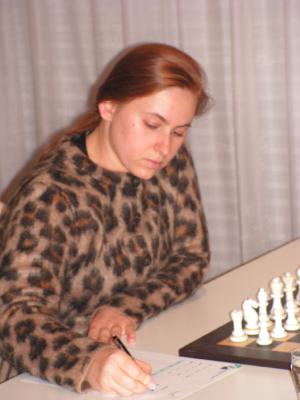Today is an incredible, historic, wonderful day for women in chess!
Judit Polgar beats Veselin Topalov. Topalov is the highest ranked chess player in the world. He was the FIFE World Chess Champion for 2005. This is the first time that a woman has ever beaten the highest ranked player. Topalov’s chess rating has been at 2890, and is currently 2813. Polger’s chess rating is currently 2710.

The Essent Chess Tournament 2006 is currently going on (Oct 20-28). (The site is mainly not in English, but the chess moves, photos, and standings are quite readable. Judit is in the Crown Group.) In this tournament (today’s news), Judit Polgar, 30, beat Veselin Topalov, 31. There are six rounds in the tournament, and so far, Polgar is winning the first two rounds!
To watch the winning game, click here. Then hit the play button “>” to watch each move. Judit plays white. It is incredible to me that in her moves 16-17 and 26-27 are both two-part moves to accomplish something – that she is calm enough to move her pieces in time to where she wants them to be. Try to guess move 26 before she makes it. The commentators say this was her winning move. Pause at move 25 and see what you think.
Links:
* She is a mother of two, and returned to chess in January ’06 after a fifteen-month maternity leave.
* Judit Polgar wikipedia entry.
* The chess games of Judit Polgar.
* Some photos of Judit.
* I wrote about the Polgar family before here (specifically her father and how he trained his three daughters, the youngest of which, Judit, is the most successful in chess).
* Brief bio from chessgames.com, “Judit Polgar was born in Hungary in 1976. Her childhood consisted of an extensive chess education from her father and her sisters, and she began to compete internationally as early as 1984. In 1991 she became an International Grandmaster by winning the “men’s” Hungarian championship. At fifteen years and five months of age, she was the youngest grandmaster in history, breaking a record that Robert James Fischer had held for over 30 years. She has been the highest-rated woman ever since FIDE’s January 1990 list, and in 2003 she entered the overall top ten.”
* Judit’s sister Susan Polgar runs a Chess Center in NY and has an active and very interesting blog.